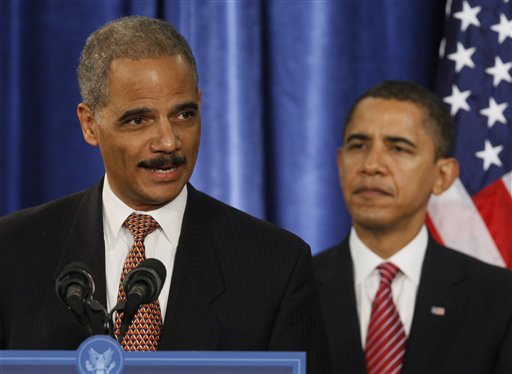Bush DOJ Rule Revokes Immigrants’ Right to Counsel
A last-minute Bush era rule upends immigrant rights to re-open a case if they could show that they were denied a fair hearing due to their lawyer’s mistakes.
Jul 31, 2020158 Shares158.4K Views
On Jan. 7, just two weeks before the inauguration of President Obama, Attorney General Michael Mukasey ruledthat immigrants have no right to be represented by a lawyer, and no right to appeal an adverse ruling based on a lawyer’s mistakes.
“Neither the Constitution nor any statutory or regulatory provision,” the Attorney General wrote, “entitles an alien to a do-over if his initial removal proceeding is prejudiced by the mistakes of a privately retained lawyer.”
Illustration by: Matt Mahurin
This last-minute decision has gotten little media attention, but it has dismayed immigration lawyers, who say clients frequently come to them with legitimate asylum or other claims that should allow them to remain in the United States, but that their previous lawyers either didn’t know the law, missed a critical deadline or just didn’t bother to communicate with their client. For the last 20 years, immigrants have had the right to re-open a case if they could show that they were denied a fair hearing due to their lawyer’s mistakes.
Immigration attorney Ann Buwalda, for example, has a client, a man in his mid-20s who fled Egypt after he was attacked by Islamic extremists there. The client, whose name Buwalda could not release, filed a petition for asylum in the United States, claiming that as a Christian, he would be persecuted if he returned to Egypt. An immigration judge ruled that wasn’t sufficient to merit asylum, and the Board of Immigration appeals affirmed that decision. His lawyer never told him the decision had been issued, however. In the meantime, the young man married a U.S. citizen. When he and his wife entered an immigration office in Norfolk, Va. to fill out the necessary paperwork to register their marriage, he was arrested.
“He was handcuffed and taken away because the [Board of Immigration] decision triggers 30 days to leave the country, or a deportation order takes effect,” said Buwalda. “They took him to jail, and his wife was left behind, wailing in distress.”
When Buwalda took over the case, she said the previous attorney initially refused to cooperate or even to turn over the case files. “Obviously there was a problem with prior counsel. Had my client received appropriate communication from his lawyer, he would not be in detention and he would be happily enjoying marital bliss.”
Buwalda says she sees about three or four clients a month whose cases were similarly mishandled by a previous attorney.
Immigrants are particularly vulnerable to exploitation by unethical attorneys. “They have language barriers, and often they don’t read or can’t understand what they read,” said Buwalda. “So a lot is based on trust.”
Shoddy lawyering and unlicensed legal practice by “notarios” who are not lawyers but often claim to be is so widespread that the American Bar Associationspecifically warns about them on its website. “In many cases the work performed by such individuals results in missed deadlines, the filing of incorrect or incomplete forms, or the filing of false claims with the government,” according to the ABA. “As a result of the advice or actions of such individuals an immigrant can miss opportunities to obtain legal residency, can be unnecessarily deported, or can be subject to civil and/or criminal liability for the filing of false claims.”
A 2007 investigation by Business Weekfound that “thousands of immigrants fall victim to crooked or incompetent lawyers or to people posing as lawyers. . . . The attorneys either mishandle their applications or simply take their money and never bother filing the required documents.”
Emanuel Tippon, an immigration attorney based in Hawaii who’s writing a book on the problem of ineffective counsel in immigration proceedings and has reviewed more than a thousand such cases, confirms that the problem is widespread. “Many of these people are not lawyers. They may be real estate agents,” he said. “The problem with these people is that the damages they cause are irreversible.”
Mukasey’s ruling appears to affect not only the right to appeal due to a lawyer’s error, but the right even to consult with a lawyer before appearing before an immigration judge.
“In the past, there was a right to be represented by an attorney, just not at the expense of the government,” said Benjamin Johnson, executive director of the American Immigration Law Foundation. “If you have a right to an attorney, and you get picked up at a meatpacking plant somewhere and locked up in a detention center, and you’re all of a sudden in front of a judge, you can say ‘I want to talk to a lawyer.’ If you don’t have a right to an attorney you don’t have an opportunity to say I want to talk to a lawyer. This gives a much stronger green light to those judges that they can push the cases ahead.”
Of course, that’s the point. Organizations that strongly oppose illegal immigration complain that it’s too easy for undocumented immigrants to delay deportation by arguing that their previous lawyer was “ineffective.” They defend Mukasey’s decision as sound policy to prevent such delays.
“There is no constitutional right to counsel in a removal proceeding,” said Rosemary Jenks, director of government relations at Numbers USA, an organization committed to reducing immigration. “So then of course there’s not a right to effective assistance of counsel. While the Fifth amendment does guarantee due process in removal proceedings, due process does not include a right to counsel.”
Dan Stein, president of the Federation for American Immigration Reform, agrees. “There’s a traditional division between criminal and civil proceedings. The immigration bar and their advocates want every deportation proceeding to be treated like a criminal trial. That’s not the case. When you send somebody home, you’re sending them home. It’s not punitive. You’re simply making a determination as to their civil status,” he said. “The illegal immigrations advocates want everybody to get O.J. Simpson’s version of a deportation hearing.”
The actual consequences for an immigrant who’s deemed deportable can be devastating, however. They can be sent home despite having lived and worked in the country for decades and having citizen children in the United States. And they can be detained for months or even years pending an appeal. As Supreme Court Justice Luis Brandeis put it more than 80 years ago, removal from the country can result “in loss of both property and life; or of all that makes life worth living.”
The complexity of immigration law can exacerbate the problem.
“Immigration law is very complicated and it’s constantly being changed,” said Paul Halligan, a former immigration attorney for the Department of Homeland Security, now chief public defender in Newark, New Jersey. “So there’s a danger even if you have competent counsel, or counsel who’s trying to be competent, and a judge who’s trying to follow the law, they end up not getting it right. You add to that that the quality of immigration judges varies widely. Some are very good, and some are horrible, and there’s a broad range in between.”
Seventh Circuit Court of Appeals Judge Richard Posner wrote in a 2005 decisionthat “the adjudication of [immigration] cases at the administrative level has fallen below the minimum standards of legal justice.”
In fact, experts say the decisions of immigration judges vary widely depending on their politics, sympathies and competence. A study publishedby three law professors in the Stanford Law Review in 2007 revealed that outcomes in asylum cases, for example, depended on which judge was hearing them, even when the facts were substantially similar. For example, Colombian asylum applicants whose cases were heard in the federal immigration court in Miami had a 5 percent chance of winning asylum with one of that court’s judges and an 88 percent chance of winning before another judge in the same building.
And in July, an Inspector General’s reportrevealed that aides at the Department of Justice had applied a political litmus test when hiring immigration judges and members of the Board of Immigration Appeals.
“So you’ve packed a court with people who potentially have no qualifications other than being good Republicans or good politicians into a system with effectively no federal review to ensure that decisions are consistent with the law and immigration policy as it develops,” said Johnson.
The quality and fairness of judges is now even more important because Mukasey’s decision enhanced immigration judges’ power and discretion. By ruling that immigrants don’t have a right to re-open their cases due to attorney errors, Mukasey left the choice to the immigration judges. Those decisions cannot be appealed to a court.
Yet the consequences may be years in prison-like detention. That’s particularly true since September 11, 2001, when the government expanded its detention authority. Increasingly, it’s used immigration proceedingsto detain foreigners suspected of having ties to terrorism, but without having to provide any evidence that would stand up in a criminal court.
And the conditions of some of those detention centers are deplorable. According to a 2003 reportby DOJ’s Office of Inspector General, prison officials in two immigration detention facilities severely mistreated detainees they labeled as “high interest,” even though in most cases they actually had no connectionto terrorism.
Earlier this month, about 130 immigrants’ rights organizations and lawyers sent a letterto Attorney General Eric Holder urging him to reverse Mukasey’s decision. “The decision overrules decades of precedential decisions from the Board of Immigration Appeals and disagrees with numerous courts of appeals on an issue of great national significance,” they wrote. They also argued that Mukasey improperly reached beyond the issue in the case he was deciding to rule on a constitutional question that he should not have addressed. As the new Attorney General, Holder could reconsider the decision and issue a new ruling, and because immigration judges are employees of the Department of Justice, that would effectively change the law.
Responding to a written question about Mukasey’s ruling before his confirmation hearing, Attorney General Eric Holder wrote in response: “The Constitution guarantees due process of law to those who are the subjects of deportation proceeding. I understand Attorney General Mukasey’s desire to expedite immigration court proceedings, but the Constitution requires that those proceedings be fundamentally fair. For this reason, I intend to reexamine the decision should I become Attorney General.”
Immigrants’ advocates are hopeful.
“How far do you want to go in pushing your apparent authority in continuing to reduce due process for immigrants?” asked Johnson, of the American Immigration Law Foundation. “Just because we can do something doesn’t mean we should.”

Hajra Shannon
Reviewer
Latest Articles
Popular Articles

